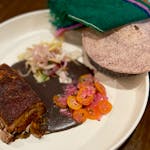It's the most wonderful time of the year to be drinking wines from the Holy Land.
Actually, that sentiment would hold true in any month (and apologies if it prompted an unwanted earworm). And it applies no matter one's faith, or lack of same.
That's because the wines of Israel and Lebanon are not only better than ever, but generally provide great value, as well. Bonus points if they also resonate with your religious heritage.
We tend to think of that slice of the Eastern Mediterranean region as being desert-like, arid land unsuitable for any crops. But there are fertile plains and hillsides throughout the area, with temperate ocean breezes leavening the hot sun as the days turn to surprisingly cool evenings.
Wine is mentioned 231 times in the King James Bible, starting with Genesis 9:21 and continuing through Jesus turning water into wine and, of course, setting the stage for communion's sacramental wine in his final days.
Many of the locales cited in the Bible are now part of Islamic nations — Syria, Iraq, Egypt — that are not terribly enamored of the consumption, much less the production, of fermented grape juice.
In other parts of the Middle East, ongoing strife provides another challenge and distraction for those striving to make wine. As Jill Boutros, a Faribault, Minn., native who, with her husband, Naji, owns and operates Lebanon's stellar Belle-Vue winery, put it in an e-mail: "I definitely prefer [for Lebanon] to NOT be in the headlines. :-)."
And while modern-day Israel was the nexus for most biblical happenings, Lebanon played a significant role, especially in the New Testament.
"Jesus definitely spent time in southern Lebanon, having visited Tyre and Sidon," Boutros said. "Mary, his mother, was born in a village in what is now Lebanon, and her father's tomb is a known shrine in the south. Also, the cedars of Lebanon are mentioned something like 75 times in the Bible."
These days, savvy wine consumers are quite enamored of at least three wineries whose wares are available here. Massaya produces super-tasty red, wine and pink wines. Belle-Vue makes a pair of simply fabulous, earthy but elegant Bordeaux blends, La Chateau and La Renaissance, that drink way above their $40 (give or take) price point.
And the granddaddy of all Lebanese wineries, Chateau Musar, is still going strong despite the recent passing of Serge Hochar, as respected as most any winemaker in the world. Sons Gaston and Marc have maintained steady steering of Musar, still bottling soulful reds and gorgeous whites.
Stalwart work is being done to the south. Pretty much everything I've sampled from Israel's Galil Mountain and Golan Heights has been swell, and Yarden's red and white wines are perennial mega-bargains.
These wines have been available here for a good while, and now have been joined by a truly exciting new arrival. Cremisan Cellars is part and parcel of a monastery that sits on the border between the West Bank and Jerusalem, and is part of the Salesian order, founded by an Italian priest named Don Bosco to help poor children during the Industrial Revolution.
The Italian heritage is part of what brought the winemaker from Umbria's standout Falesco winery, Riccardo Cotarella, on board to oversee the cellar operation.
The results are three superb wines, all priced at $23: the rustic, Rhône-like red Star of Bethlehem Baladi and two whites, the delicate but complex Dabouki and the richer Hamdani-Jandali.
Even cooler: In keeping with the order's mission, proceeds go to help children in crisis-laden African countries.
And what could be more holy than that?
Bill Ward writes at decant-this.com. Follow him on Twitter: @billward4.




